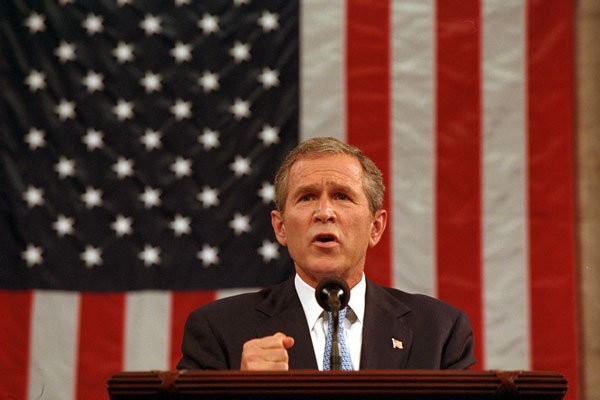Atentados Terroristas – Será que Bush estava certo?

“On September the 11th, enemies of freedom committed an act of war against our country. Americans have known wars – but for the past 136 years, they have been wars on foreign soil, except for one Sunday in 1941. Americans have known the casualties of war – but not at the center of a great city on a peaceful morning. Americans have known surprise attacks – but never before on thousands of civilians. All of this was brought upon us in a single day – and night fell on a different world, a world where freedom itself is under attack.” – George W. Bush
Após os horripilantes atentados em ocorridos em 11 de setembro de 2001, o Ex-Presidente George W. Bush fez um discurso muito duro, no dia 20 de setembro do mesmo ano, mas pertinente e bem colocado, perante o Congresso americano. Disse que os ataques foram um duro golpe para as nações livres e democráticas. Teve apoio modesto de alguns países, e mais enérgico de outros.
Para quem não se lembra, o Primeiro Ministro Britânico Tony Blair esteve lá, demonstrando o apoio incondicional que os Estados Unidos teriam da Inglaterra. Pois bem. Logo no início Bush disse o seguinte: “Tonight we are a country awakened to danger and called to defend freedom. Our grief has turned to anger, and anger to resolution. Whether we bring our enemies to justice, or bring justice to our enemies, justice will be done”.
Na sequência, agradeceu o apoio de alguns países, destacando, o papel da Grã Bretanha: “We will not forget South Korean children gathering to pray outside our embassy in Seoul, or the prayers of sympathy offered at a mosque in Cairo. We will not forget moments of silence and days of mourning in Australia and Africa and Latin America. Nor will we forget the citizens of 80 other nations who died with our own: dozens of Pakistanis; more than 130 Israelis; more than 250 citizens of India; men and women from El Salvador, Iran, Mexico, and Japan; and hundreds of British citizens. America has no truer friend than Great Britain. Once again, we are joined together in a great cause — so honored the British Prime Minister has crossed an ocean to show his unity with America. Thank you for coming, friend.”
No entanto, algumas mensagem foram muito bem postas e demonstraram o respeito dos EUA aos islâmicos: “I also want to speak tonight directly to Muslims throughout the world. We respect your faith. It’s practiced freely by many millions of Americans, and by millions more in countries that America counts as friends. Its teachings are good and peaceful, and those who commit evil in the name of Allah blaspheme the name of Allah. The terrorists are traitors to their own faith, trying, in effect, to hijack Islam itself. The enemy of America is not our many Muslim friends; it is not our many Arab friends. Our enemy is a radical network of terrorists, and every government that supports them. Our war on terror begins with al Qaeda, but it does not end there. It will not end until every terrorist group of global reach has been found, stopped, and defeated.”
Em seu famoso discurso, Bush falou com todas as letras: “No one should be singled out for unfair treatment or unkind words because of their ethnic background or religious faith.” E, além disso, afirmou: “Every nation, in every region, now has a decision to make. Either you are with us, or you are with the terrorists. From this day forward, any nation that continues to harbor or support terrorism will be regarded by the United States as a hostile regime”.
Não vou me estender nas transcrições. Mas, um pergunta se torna necessária: Bush estava certo? Parece que sim. Após o início da “Guerra contra o Terror”, os Estados Unidos foram gradativamente perdendo o suporte dos aliados. Hoje, vemos o Estado Islâmico crescendo e ataques ocorrendo pelo mundo. As lições de Kenneth Watz, em seu famoso “The Man, State and War” continuam vivas, assim como a pertinente análise apresentada por Samuel P. Huntington, em 1992, no seu brilhante artigo, “The Clash of Civilizations?”, para a Foreign Affairs.
No entanto, vejam – nos trechos acima transcritos – como a mensagem foi bem posta. Não houve perseguição ou preconceito religiosos. Não se falou em fechar as fronteiras. Não se defendeu o isolacionismo das nações.
Por isso, não é possível comparar a postura do Ex-Presidente americano com a do atual candidato Republicano Donald Trump. Quem acredita que este último seria a solução para a o problema não enxerga que a postura dele será a de usar “gasolina para apagar o incêndio”. Fechar o país, incentivar a segregação e explorar o medo para considerar os que pensam diferente como inimigos não é um caminho sábio. Ao revés, um discurso desses é nocivo para os Estados Unidos e para o mundo. É momento de rever os fatos ocorridos após 11 de setembro de 2001 e buscar, novamente, um apoio global contra o terrorismo. Definitivamente, não devemos incentivar o ódio religioso, cultural ou étnico.




